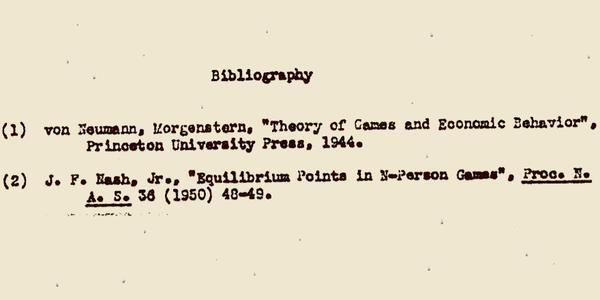
When John Nash wrote “Non-Cooperative Games,” his Ph.D. dissertation at Princeton in 1950, the text of his thesis (read it online) was brief. It ran only 26 pages. And more particularly, it was light on citations. Nash’s diss cited two texts: John von Neumann and Oskar Morgenstern’s Theory of Games and Economic Behavior (1944), which essentially created game theory and revolutionized the field of economics; the other cited text, “Equilibrium Points in n‑Person Games,” was an article written by Nash himself. And it laid the foundation for his dissertation, another seminal work in the development of game theory, for which Nash was awarded the Nobel Prize in Economic Sciences in 1994.
The reward of inventing a new field is having a slim bibliography.
If you would like to sign up for Open Culture’s free email newsletter, please find it here. It’s a great way to see our new posts, all bundled in one email, each day.
If you would like to support the mission of Open Culture, consider making a donation to our site. It’s hard to rely 100% on ads, and your contributions will help us continue providing the best free cultural and educational materials to learners everywhere. You can contribute through PayPal, Patreon, and Venmo (@openculture). Thanks!
Note: An earlier version of this post appeared on our site in June, 2015.
Related Content:
The Shortest-Known Paper Published in a Serious Math Journal: Two Succinct Sentences
The World Record for the Shortest Math Article: 2 Words
How to Dance Your Dissertation: See the Winning Video in the 2014 “Dance Your PhD” Contest


Disertasi dgn 26 halaman dan citation 2 tulisan merupakan cerminan pemikiran john nash, merancang ide dgn ringkas dan ilmiah menjadi tanda kedalaman ilmu yg dimiliki, apkh bisa di terapkan dikampus2 di indonesia yg kuat di ketentuan harus 200 halaman?
Nice! But you forgot to mention that Nash’s self-citated earlier paper, “Equilibrium Points in n‑Person Games”, is itself two pages long and also has two citations: one to the same von Neumann and Oskar Morgenstern work, and one to another two-page article. In this context 26 pages seems proportionally in line with articles vs. dissertations in the more verbose human and social sciences. Fascinating!
Paper that corrects physics h ttps://zenodo.org/records/15354776
A mathematician friend of mine had a 25-page dissertation. I commented to him that mine (Atmospheric Physics) was 110, and in the stacks I saw a literature dissertation that was north of 1000 pages. He replied, “The length of the dissertation is inversely proportional to the rigor of the criteria of right knowledge in the discipline.”
Pl makes research proposal for PhD program on After Care of Released convicts
Sir,
Pls send your short number of pages thesis. Thanks
Dr. Chitta Ranjan Sarker
Bangladesh
Hi brother
I have desired to earned my PhD how to earned it through fully funded scholarship
Hi brother
I have desired to earned my PhD how to earned it through fully funded scholarship
Currently I am here in uae searching for job and PhD